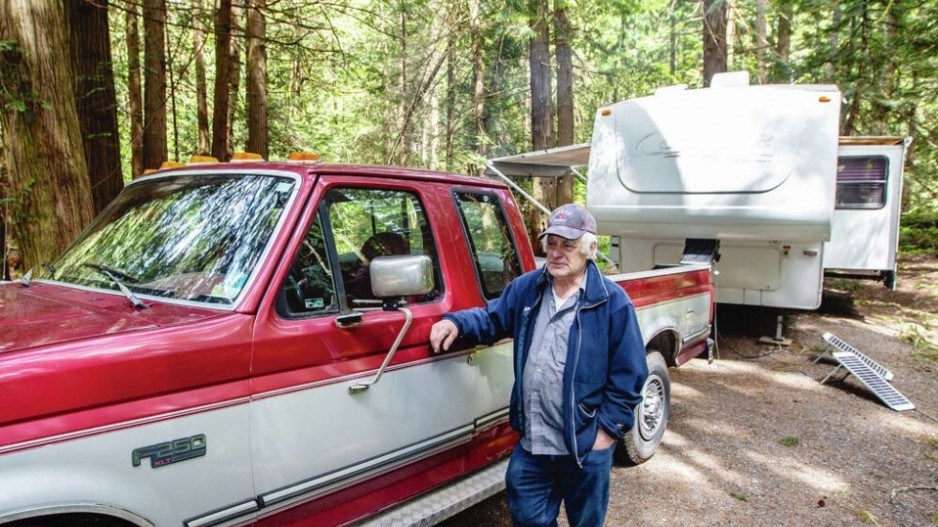Gerard Landry parked his 30-foot RV in a tranquil spot at Bamberton Provincial Park, about 35 minutes from his home in Saanich.
He and his wife, Beth, plan to stay for about five days — or until the battery runs low — and just enjoy the close-to-home getaway on the edge of Saanich Inlet.
With gas prices spiking to a record $2.35 a litre this week — and no end to increases in sight — Landry is like a lot of RVers who plan to camp this year, but keep driving to a minimum.
“The good thing about the Island is there’s a lot of great places you can get to, without spending a lot of time getting there,” said the retired University of Victoria custodian. “When we used to live in Ontario, you would have a four-hour drive to get to a campsite.”
Landry said they will likely book spots at private campsites in the Nanaimo and Port Alberni areas, and provincial parks west of Sooke.
He said the cost of filling both tanks on his 1993 Ford F250 pickup has risen to about $175, which is enough to get him to any of those destinations and back. But anything off the Island, including ferry costs, just isn’t in the cards anymore.
Rising gas prices are hitting wallets across Canada. The average was $2.12 a litre across all provinces on Monday — 14 cents higher than a week ago — and analysts are expecting more increases heading into the summer driving season.
“We’re seeing gas-price records repeatedly shattered across the country,” said analyst Dan McTeague, president of Canadians for Affordable Energy, which tracks pump prices.
Gas prices have risen rapidly over the past year as a tight global supply has been worsened by the Russian invasion of Ukraine and sanctions against the global energy superpower.
Last June, the price for regular gas in Greater Victoria was $1.55 a litre, and the average price in Canada was about $1.34, according to Statistics Canada.
Jamie Cox, president of the B.C. Lodging and Campgrounds Association, said so far, high gas prices are having little effect on bookings for the association’s more than 400 members, who operate 22,184 campsites across the province, including more than 5,000 on Vancouver Island and the Gulf Islands.
Cox said during the May long weekend — a key indicator of travel plans for the summer — private campgrounds were at pre-pandemic occupancy levels, and bookings for July and August are in the high 80% range or already full.
“It’s odd because it’s had zero impact … we anticipated something, but we’re not seeing any cancellations,” said Cox, noting RV travelling has seen an explosion in popularity over the last couple of years, boosted by the pandemic, and the Okanagan and Vancouver Island continue to be popular destinations.
“People realized they didn’t have to leave Canada or go far from to find beautiful places.”
While it’s not stopping people from hitting the road, rising gas prices could affect travel patterns, Cox said. Members are seeing longer stays at campgrounds, and people doing “circle routes” to a series of destinations within an hour or 90-minute radius.
Campers can also expect to pay more at private campgrounds this year, said Cox, with prices ranging from $50 to $80 a night, depending on the site and services. Yearly increases on average are at about 2.5%, he said.
“It’s the cost of living, inflation,” he said. “Operators are looking at increasing costs for staff, upgrades and other operating costs, and seeing where their net profits are … it’s not a dramatic increase.”
B.C. Parks campsites are generally less expensive at about $10 to $30 per party a night. Of the 10,700 campsites under provincial management, 55% are reservable and 45% are available on a first-come, first-served basis.
Shane Richards, who operates Surf Grove Campground on Cox Bay near Tofino, said the peak months of July and August are nearly sold out, with campers coming from all over B.C. and Alberta as well as some international bookings.
“Gas prices are on our radar,” said Richards. “But I think people being cooped up and having minimal travel the past two years is outweighing the price of gas.”
Nightly rates for the 200 sites at Surf Grove can range up to $170, depending on services and proximity to the beach. Entering its third full season, Surf Grove has brought much-needed campsites to the popular area, said Richards.
“We have lots of beautiful hotels and Airbnbs, but not a lot of available camping” he said. The Green Point campground in Pacific Rim National Park opened reservations on Jan. 1 “and by noon, July and August are sold out,” Richards said.
“We’re definitely turning away more than we’re welcoming, just due to the demand,” he said.
Craig Little, president of Arbutus RV, which has six locations and one service centre on the Island, says he isn’t seeing higher gas prices affect sales, even though the cost of RVs has increased since last year.
“Are gas prices top of mind? Sure,” he said. “But they haven’t stopped people [from travelling] in the past and I don’t think we’ll see it happen during this period, either.”
How to improve the fuel economy of any vehicle
• Drive conservatively and avoid “jack rabbit” starts, rapid acceleration and hard braking, which can lower fuel economy by 15% to 30% at highway speeds and 10% 40% in stop-and-go traffic.
• Minimize cold-engine operation, meaning drivers should start the engine and then drive the car normally to warm the engine.
• Observe speed limits, remove unnecessary items from your vehicle, use cruise control to minimize speed fluctuations on highways and avoid excessive idling to help reduce fuel consumption.
— Canadian Automobile Association




